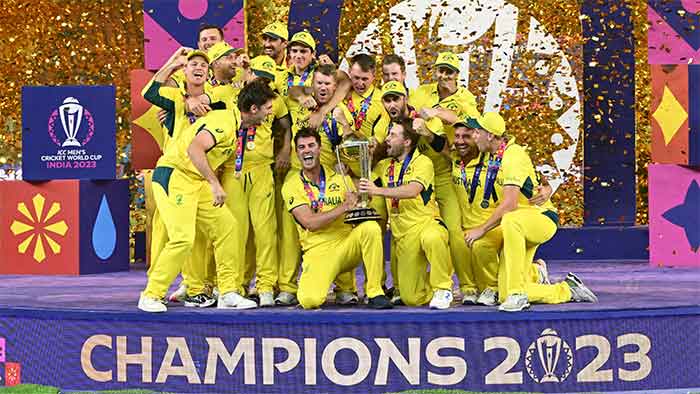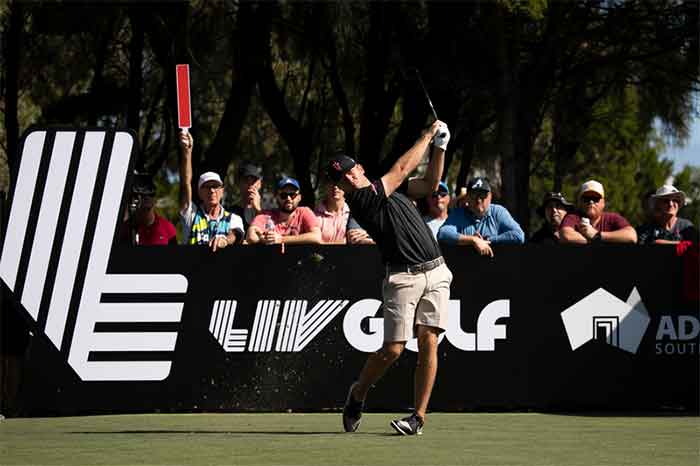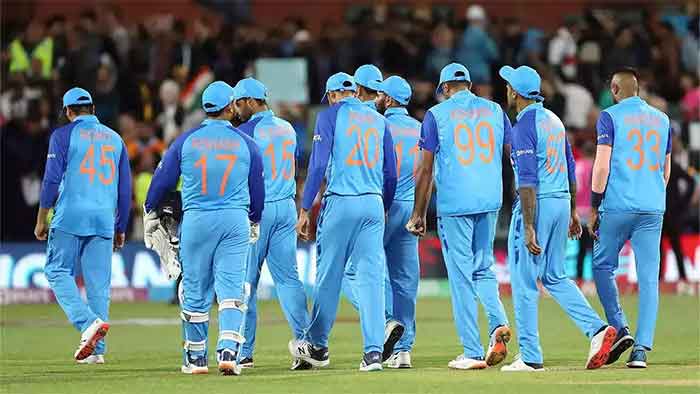
Here’s the big question in Jock Culture these days: Is the Kingdom of Golf being used to sportswash the Kingdom of Saudi Arabia? Or is it the other way around? After all, what other major sport could use a sandstorm of Middle Eastern murder and human-rights abuses to obscure its own history of bigotry and greed? In fact, not since the 1936 Berlin Olympics was used to cosmeticize Nazi Germany’s atrocities and promote Aryan superiority have sports and an otherwise despised government collaborated so blatantly to enhance their joint international standings.
Will it work this time?
The jury has been out since the new Saudi-funded LIV Tour made an early August stop at the Trump National Golf Course in Bedminster, New Jersey. (That LIV comes from the roman numerals for 54, the number of holes in one of its tourneys.) And I’m sure you won’t be surprised to learn that it was hosted by a former president so well known for flouting golf’s rules that he earned the title Commander-in-Cheat for what, in the grand scheme of things, may be the least of his sins.
That tournament featured 10 of the top 50 players in the world. They were poached by the Saudis from the reigning century-old Professional Golfers Association (PGA), reportedly for hundreds of millions of dollars in signing bonuses and prize money. It was a shocking display for a pastime that has traded on its image of honesty and sportsmanship, not to mention an honor system that demands players turn themselves in for any infractions of the rules, rare in other athletic events where gamesmanship is less admired.
No wonder our former president hailed the tour as “a great thing for Saudi Arabia, for the image of Saudi Arabia. I think it’s going to be an incredible investment from that standpoint, and that’s more valuable than lots of other things because you can’t buy that — even with billions of dollars.”
The tournament was held soon after Joe Biden gave that already infamous fist bump to crown prince and de facto Saudi ruler Mohammed bin Salman. The two events radically raised bin Salman’s prestige at a moment when, thanks to the war in Ukraine, oil money was just pouring into that kingdom, and helped sportswash the involvement of his countrymen in the 9/11 attacks, as well as the brutal murder and dismemberment of Saudi dissident and Washington Post columnist Jamal Khashoggi.
Deals They Couldn’t Refuse
The buy-off money came from the reported $347 billion held by the Public Investment Fund, Saudi Arabia’s sovereign wealth fund. Top golfers were lured into the LIV tour with sums that they couldn’t refuse. A former number-one player on the PGA tour, Dustin Johnson, asked about the reported $125 million that brought him onto the Saudi tour, typically responded by citing “what’s best for me and my family.”
Phil Mickelson, the most famous of the LIV recruits and a long-time runner-up rival of Tiger Woods, justified his reported $200 million in a somewhat more nuanced fashion. In a February interview at the website The Fire Pit Collective, he admitted that Saudi government officials are “scary motherfuckers,” have a “horrible record on human rights,” and “execute people… for being gay.” Yet he also insisted that the LIV was a “once-in-a-lifetime opportunity to reshape how the PGA Tour operates.”
Family needs and the supposed inequities of the PGA’s previously hegemonic universe were the explanations a number of golfers used to justify biting the hand that had fed them for so long. Meanwhile, Tiger Woods, the greatest recipient of PGA largesse and probably the greatest golfer of our time, if not any time, reportedly turned down an almost billion-dollar offer with sharp words for those who had gone for the quick cash.
The PGA obviously agreed and barred any golfer who took up the Saudi offers from its tournaments. In response, some of them promptly sued the PGA.
The Kingdom of Golf
On the face of it, creating a Kingdom of Golf might not seem like a crucial thing for a morally challenged monarchy to do. After all, golf isn’t exactly a charity or a social justice campaign that’s likely to signal your virtue. It’s just a game whose players use sticks to swat little balls into holes in the ground while strolling around. It’s not even good exercise and far less so if you’re driving the course in a motorized cart or hire a caddie to carry your sticks. And it gets worse. After all, the irrigation water and poisonous chemicals necessary to keep the playing fields luxuriantly green at all times are abetting ecological disaster.
Golf symbolized reactionary greed even before the Saudis entered the picture. For starters, its competitors are among the only professional athletes ranked purely by the cash prizes they’ve won. And the leading golfers invariably earn far more from endorsements and speaking engagements. The sport’s almost comic upper-class snootiness sometimes seems like an orchestrated distraction from the profound racism, sexism, and anti-Semitism lodged in its history and, even today, the discrimination against women that still exists at so many of the leading country clubs that sustain the game.
Golf has long been retrograde, exclusionary, and money-obsessed. To put that in perspective, the estimated revenue of the Professional Golf Association in 2019 was $1.5 billion — and it boasts a non-profit status that’s sometimes been questioned. Lucrative as it is, it also proved distinctly vulnerable to an attack by an oil-soaked autocracy that, in warming up to invade golf, had already invested in Formula One racing, e-sports, wrestling, and its most recent controversial purchase, a British Premier League soccer team (which provoked protests from fans and Amnesty International).
Still, the Saudis’ move on golf was even bolder, more ambitious, and somehow almost ordained to happen.
Unlike football and baseball, which are convenient amalgams of socialism for the owners (in their collusive cooperation) and dog-eat-dog capitalism for the players and other personnel, golf is more of a monarchy along the lines of, um, Saudi Arabia. Until the LIV Tour came along, the main PGA tour, that sport’s equivalent of the major leagues, had been all-powerful in its control over both golfers and venues.
Over the years, golfers have indeed complained about that, but except for Greg Norman, a 67-year-old Australian former champion, not too loudly. Now a highly successful clothing and golf-course-design entrepreneur, Norman is called the Great White Shark for his looks and aggressive style. No wonder he’s now the CEO of LIV Golf and the ringleader of the campaign to recruit the top pros to play in the breakaway tour.
Norman denies that he answers to the crown prince, but his attempts to distance himself from that ruthless Saudi ruler are not taken seriously by most observers of golf, including the Washington Post’s Sally Jenkins, who wrote:
“Let’s be frank. LIV Golf is nothing more than a vanity project for Norman and his insatiable materialism — and an exhibition-money scam for early-retiree divas who are terrified of having to fly commercial again someday. By the way, the supposed hundreds of millions in guaranteed contracts for a handful of stars — has anyone seen the actual written terms, the details of what Phil Mickelson and Dustin Johnson will have to do to collect that blood-spattered coin, or is everyone just taking the word of Norman and a few agents trying to whip up commissions that it’s all free ice cream?”
One of the best sports columnists, Jenkins may seem excessive in her attack on Norman, but the passions that golf and Saudi Arabia have raised separately only increase in tandem. On the one hand, there’s the outrage when it comes to Saudi Arabia’s murderous human-rights abuses and Washington’s continuing complicity with the regime, thanks in particular to its ongoing massive arms sales to that country. (The latest of those deals, largely Patriot missiles sold to that country for $3 billion, feels distinctly like a kind of bribery.)
On the other hand, there’s the long-standing resentment of golf as a symbol of rich, white, male supremacy. In fact, it’s still seen as a private meeting place to create and maintain relationships that will lead to significant political and business decisions, the sports equivalent of, um, Saudi missile deals.
The pro golfers profiting from the current bonanza may not engender much sympathy, but the derision for their materialism should, at least, be put in context. Until the LIV came along, they had next to no options in their sport and few of them made Mickelson- or Johnson-style money. Worse yet, their lonely gunslinger lifestyles made unionization at best the remotest of possibilities, especially for figures deeply wired into the corporate community through their sponsorship deals.
The Saudi golf coup (because that’s indeed what it is) has taken place at an interesting juncture for the sport and its two most compelling figures, Trump and Tiger, who have indeed played together, both seeming to enjoy the trash talk that went with the experience.
Tiger in Twilight
Tiger, who is now in steep decline, has long been the face of the sport at its most accomplished, captivating, and richest despite, or perhaps because of, his paradoxical nature.
His first auto accident in 2009 revealed a tortured soul involved a maelstrom of sexual infidelities and occasioned a re-evaluation of his mythic rise. No surprise then that he’s struggled ever since, briefly regaining his form before more accidents and surgeries diminished his dominance.
As long as he continued to show up and hit a ball, popular interest in the game was sustained and the PGA’s grip held firm. As he diminished, however, so did public fascination with golf.
In a way, he had been Tiger-washing the sport. It was hard to sustain a critique of golf’s retrograde and exclusionary nature, however justified, while it hid behind his Black face. Of course, that vision of golf was already wearing thin when Tiger refused to define himself as African-American, preferring “Cablinasian” — meant to reflect his racial mix of Caucasian, Black, (American) Indian, and Asian.
With Tiger, at 46, fading as an active force, PGA golf had already become vulnerable to a coup long before the Saudis and The Donald appeared on the scene. And who could have been a handier guy for those Middle Eastern royals than one with such experience in coups, even if his first try, with all those armed deplorables, failed on January 6, 2021.
This time around, though, Trump had millionaires with golf clubs, Middle Eastern oil royalty, and the equivalent of bottomless sacks of PAC money.
And, of course, with Trump involved, anything could happen. The first time he was infamously linked to sports, in the early 1980s as the owner of the New Jersey Generals of the upstart United States Football League (USFL), he managed to destroy his own organization in what would emerge as his signature style of reckless, narcissistic malfeasance. An early Trump lie (in an interview with me, no less) was that the USFL would continue its summer schedule so as not to interfere with the National Football League’s winter one. Within days of that statement, he led a lawsuit aimed at forcing a merger of his league and the National Football League. It ended badly for Trump and the USFL.
This time around, Trump has said that the LIV Tour would avoid scheduling tournaments in conflict with major PGA events. That will probably turn out to be anything but the case, too. So how will his latest foray into Jock Culture play out? Will the PGA beat back the Saudi coup (maybe by raising its prize money) or will the Saudis burnish their global image through a sport undeservedly renowned for integrity and class?
And what about the Commander-in-Cheat? If only this Saudi enterprise would leave him too busy on the links (not to speak of fighting off jail in connection with those purloined secret documents of his) to run for the presidency again in 2024.
Ultimately, whether Saudi Arabia or golf gets sportswashed, it’s Trump we need to rinse out of our lives.
Follow TomDispatch on Twitter and join us on Facebook. Check out the newest Dispatch Books, John Feffer’s new dystopian novel, Songlands (the final one in his Splinterlands series), Beverly Gologorsky’s novel Every Body Has a Story, and Tom Engelhardt’s A Nation Unmade by War, as well as Alfred McCoy’s In the Shadows of the American Century: The Rise and Decline of U.S. Global Power, John Dower’s The Violent American Century: War and Terror Since World War II, and Ann Jones’s They Were Soldiers: How the Wounded Return from America’s Wars: The Untold Story.















































